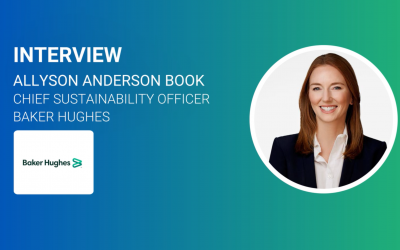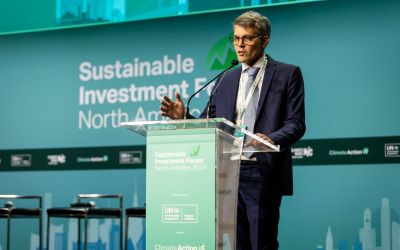Tony Burdon on the importance of moving pension fund commitments into real world action
Tony Burdon, CEO of Make My Money Matter, talks to Climate Action about the campaign, and how in the past three years over 60 UK pension funds have made serious commitments to net zero, halving emissions over the past decade. How the real challenge is to move pension fund commitments into real world action.

Tony Burdon, CEO of Make My Money Matter, talks to Climate Action about the campaign, and how in the past three years over 60 UK pension funds have made serious commitments to net zero, halving emissions over the past decade. How the real challenge is to move pension fund commitments into real world action. Though the public are engaged the engagement has been dented by the cost of living crisis though he expects demand for green pensions to grow as people learn the real power of their money.
Q. Can you tell me about the premise behind Make My Money Matter and what inspired you to join the movement/ campaign? Would you describe it as a people powered campaign?
Make My Money Matter is a UK public campaign working to ensure the trillions invested through our pensions and banks builds a better world. It was founded by acclaimed filmmaker, campaigner and UN SDG advocate Richard Curtis, and launched in 2020. I had spent time in the UK Department for International Development, leading work focused on the mobilisation of private finance into developing countries, in order to tackle climate change and help achieve the Sustainable Development Goals – the “billions to trillions” agenda. It was a good time to leave the department and set up a public campaign to create demand for investment to become more sustainable, and hopefully for more investment to be directed into emerging markets and developing countries.
The campaign is people powered in the sense that it tries to engage people with their pensions and their banks, and to move their money into sustainable and responsible investment. In our quarterly polling, on average, two thirds of people want a sustainable pension, and people are shocked to understand that their money may be driving climate change and deforestation.
We have also seen the power of businesses and other organisations too. Employers, building sustainability into their businesses, also want to ensure their staff pension does the same. Over 120 employers have signed up to our campaign to provide pensions to their staff that are committed to net zero, including halving emissions this decade. From IKEA to EY, Tesco to The Coop, Save the Children to Oxfam. This brings substantial commercial pressure to bear on pension schemes, alongside that from pension savers.
And of course, bringing a media spotlight onto the pensions industry has helped too. It is a very opaque industry; there is little or no public understanding of how it works; it’s intermediated by financial advisors, with no consumer facing ranking of costs, risks and return, nor how green they are. Pensions are probably the last industry to properly engage with its customers – pension savers.
Q. How long do you think it will take to green the £3 trillion UK pension sector and how engaged is the UK public in wanting to drive this change?
In the three years that we have been campaigning for net zero pensions, we have now seen over 60 UK pensions make serious commitments to net zero, including halving emissions this decade. Some £1.5 trillion of assets under management – half of the UK pensions sector. But we have a long way to go to include the rest of the industry, which is made up of hundreds of small schemes. Hopefully these schemes will be consolidated into larger schemes, so that savers can benefit from economies of scale, and the improved capability and approach to sustainability of larger schemes.
But more than this, is the challenge to move from pension fund commitments to real world action. So far progress is very mixed. In our 2022 Climate Action Report, while we saw leading pension funds acting, most funds did not have 2025 emissions reduction targets, and the majority had no policy to tackle deforestation risk in their portfolio. Only half had a stewardship policy aligned to limiting global warming to below 1.5C, but none had a policy on ceasing investment in companies expanding fossil fuel exploration and development (a major threat to limiting warming below 1.5C). On the positive side half of schemes reviewed were investing more in climate solutions.
The public are engaged, but engagement has been dented by the cost of living crisis. It takes time too, to build public understanding of the impact of their money; financial literacy is low in the UK, and pensions are scary things – most people aren’t saving enough for retirement, so the tendency is to “bury your head in the sand” when it comes to pensions. But I think engagement will grow, the demand for green pensions will grow as people learn the power of their money, and I think pension schemes will compete for this custom. Companies are already shifting staff schemes to greener providers.
Q. Pensions have a crucial role to play in channelling of private finance for the net zero transition - do you think that central governments need to set more aggressive capital mobilisation targets?
Our pensions build the world around us, they create the world we retire into. UK pensions are over £3 trillion, but globally they are £45 trillion. Our pensions are powerful and we need to use that power to change the world. The net zero transition requires a rapid reduction in emissions, and a rapid decline in burning fossil fuels. But this will need to be matched by an even greater increase in the supply of renewable energy – in the order of $1:$4 investment in fossil fuels vs renewables, or even more. We’ve been calling on pensions to scale up their investment in climate solutions - many are, but not at the scale needed. But I’m not sure capital mobilisation targets are the answer. There are a number of other actions too – firstly, for governments to legislate and regulate for a 1.5C aligned world – it should be mandatory for all large businesses, financial or otherwise, to publish net zero transition plans and meet them. Government policy, public spending and actions should be aligned to 1.5C, and policy or regulatory constraints to investing at scale in climate solutions should be removed. And again, government support to building the pipeline of investment grade deals will also be vital.
The most important action for governments is to be aggressive in driving the transition, in all areas of government policy, legislation and public spending. At the moment, the private sector is leading the way.
Tony Burdon will be speaking at the Sustainable Investment Forum Europe 2023 on the 9th May in Paris and you can join him by registering here.






